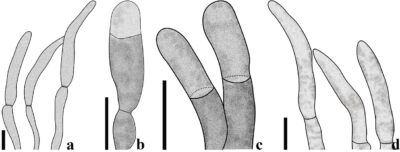Fungalpedia – Note 476, Annellosympodiella
Annellosympodiella Crous & Assefa
Citation when using this data: Tibpromma et al. 2024 (in prep.) – Fungalpedia, Ascomata.
Index Fungorum, Facesoffungi, MycoBank, GenBank, Fig. 1
Classification: Mycosphaerellaceae, Mycosphaerellales, Dothideomycetidae, Dothideomycetes, Pezizomycotina, Ascomycota, Fungi.
Annellosympodiella was introduced by Crous et al. (2014) based on morphological and molecular studies (ITS and LSU), with Annellosympodiella juniperi as the type species. The genus is named Annellosympodiella due to its morphological similarity to Annellosympodia and is characterized by conidiomata as sporodochial, erumpent, brown with brown subcylindrical cells; conidiophores are subcylindrical, brown, densely aggregated, verruculose to warty, rejuvenating percurrently, septate; conidiogenous cells are integrated, terminal, proliferating percurrently with irregular annellations, brown, verruculose, and long brown tubular collarettes; conidia are subcylindrical to narrowly obclavate, straight to curved, brown, verruculose to warty, guttulate, euseptate; hilum truncate, thickened, and slightly darkened (Crous et al. 2014).
Type species: Annellosympodiella juniperi Crous & Assefa
Other accepted species: This genus is monotypic.
Figure 1 – Annellosympodiella juniperi. a-d Conidiophores and conidia. Scale bars: a-d = 10 μm. Redrawn from Crous et al. (2014).
Reference
Entry by
Priyashantha AKH, Department of Biology, Faculty of Science, Chiang Mai University, Chiang Mai 50200, Thailand
(Edited by Saowaluck Tibpromma, Samaneh Chaharmiri-Dokhaharani, & Achala R. Rathnayaka)
Published online 3 December 2024
